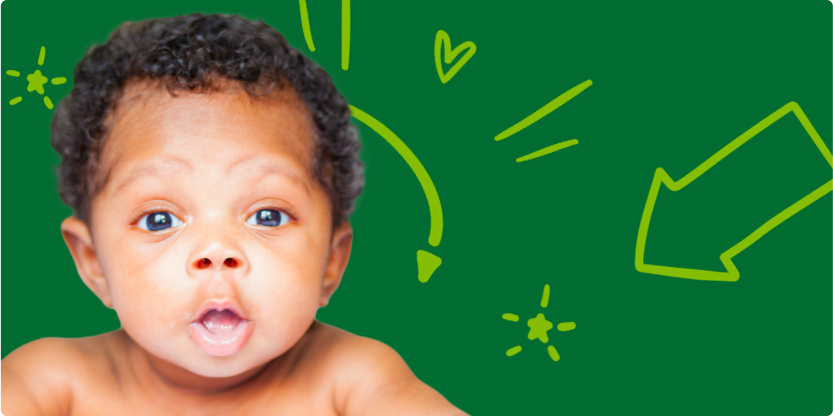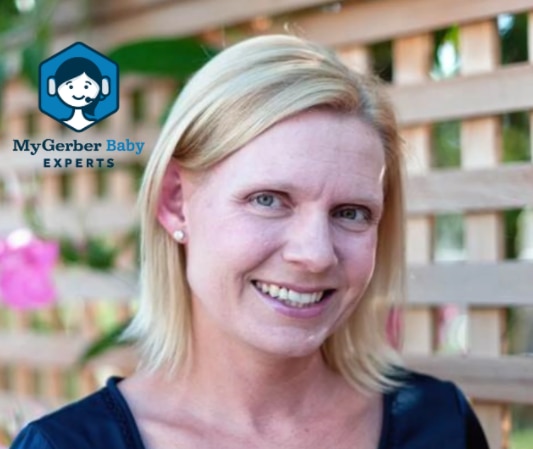The following article was written through a partnership between Gerber + Glow. See the full article here: https://www.gerber.com/parenttalk/14-sleep-questions-answered

Gerber + Glow
Questions on Newborns (0-4 months)
Q: When should I start a bedtime routine with my baby?
A: Bedtime routines can be established anytime around 4-8 weeks. Think of a short and efficient one – feeding, wash up, lullaby and crib.
Q: I have a 2-week old baby, her sleep schedule is completely backward. She is awake for most of the night and sleeps for long periods during the day. I know newborns are supposed to sleep a lot, but is there any way to get her to stay awake more during the day so that she sleeps better at night?
A: Yes! Use light and darkness to help your baby distinguish day and night. Use natural light if possible in the morning and early afternoon.
Q: How do I set up good sleep habits from the beginning?
A: First, make sure your baby is familiar with their crib – have them spend a few minutes each day acclimating. Then, put them down comfortably but awake at bedtime, staying near to help them fall asleep there. Do the same thing at night wakings and begin night weaning (reducing the feedings) if your pediatrician gives you the go-ahead. Think about teaching them to sleep in a similar way to building a house – knowing the crib is the foundation, the bedtime memory is the first floor. Then, night wakings can replicate what happens at bedtime (2nd floor of the house!), and naps will tend to fall into place last.
Q: How do you handle a baby with FOMO? He fights his naps and bedtime every day.
A: Temperament matters a lot – do your best to control the sleep environment and make it dark and boring.
Questions on Supported Sitters & Sitters (4-8 months)
Q: I have been swaddling my baby every night before going to sleep since the beginning & its formed part of his night sleeping routine. He sleeps between 8 to 10 hours since he was 2 months old. He is 4 months now but has yet to start rolling. At what stage should I stop swaddling him at night?
A: Swaddling should be stopped when the baby is rolling so maybe you’ve got a bit more time! Do your best to practice supervised tummy time during the day, even in the crib. This is the best thing to encourage core/trunk muscle development.
Q: My 5-month-old usually sleeps through the night, going to bed about 7:30 pm. There are those nights when she does wake up, if it’s around 3 am or 4 am. I don’t want her to get into the habit of eating that early, but she is hungry, is it ok to feed her?
A: I would always check with your child’s pediatrician about whether they are ready to go the whole night without feeding. Around 24+ weeks most babies will be able to go the night without feedings unless there’s a medical issue.
Q: We were told by our pediatrician that we should start trying sleep training at 4 months. She’s almost 5 months with mixed results. We’re trying to incorporate a dream feed as well. Like clockwork, she’s waking/crying at 11:30 pm. She goes to bed at 7 pm. Should I give the dream feed at 11:30 pm when she wakes and cries? I feel that could hinder her training to cry it out independently. Also, should she be getting multiple feeds during the night still? We were told by our pediatrician one bottle a night is ideal?
A: A dream feed works if the baby has it while basically sleeping so you may want to consider doing it earlier. You want to avoid the wake-cry-feed association. And yes, sounds like your pediatrician is guiding you well!
Q: I want to start crib training my son and encourage him to fall asleep independently. Right now, I’m rocking him to sleep for nap time and bed. Also, if he wakes up early or in the middle of the night, he wants to be rocked again, which can take up to an hour or more, or wants to sleep in our bed. How do I create a comforting routine to encourage him to sleep on his own and fall asleep on his own if he wakes up?
A: First, make sure your baby is familiar with their crib. Do some acclimatization for 4-5 minutes each day. Then, pick a bedtime to “start” and tell them that you will stay until they’re asleep. Then work your way out of the room in several night increments. Do the same thing with night wakings. There may be a few tough nights but if you stick with it, you and your baby will get better sleep!
Questions on Crawlers & Toddlers (8-24 months)
Q: My son is 9 months old. He will sleep in his crib at bedtime with no issues. But when I lay him in his crib for a nap he will cry and freak out until I pick him up. I don’t let him cry long because he gets so worked up that he will vomit. Do you have any suggestions on how to fix this? He used to go down in his crib for naps but I’d say the last 2 months or so he just will not go in there for a nap.
A: He may have a sensitive gag reflex which can be very tough! Make sure he’s acclimated to his crib and then coach him at nap time as you would if he was resistant at bedtime. Nap coaching can be really tough, but stick with it!
Q: Can we discuss sleep tips for toddlers? My child sleeps 8-9 hours a night versus the typical 11-12 and it doesn’t matter what time he goes to sleep. I’ve yet to find the ideal schedule because if he wakes up too early he ends up needing two naps and other days just one nap…it’s a constant cycle of just trying to stick to 4 hours of wake time and then 6 hours before bedtime instead of trying to actually have set wake and sleep times.
A: Hey mama! Awake windows are helpful, but only up to a certain point. Set bedtime and wake up times are super important after about 4 months of age. In terms of naps, most children will move from 2 naps to 1 anywhere from 13-20 months with the average being around 18 months. A common struggle during this transition is having the nap at the right time and for long enough. Start the nap after 12 pm (not before) and for at least 1.5+ hours. Do your best not to have bedtime too early (before 7 pm) because that can also lead to early rising.
Q: How can I help my toddler fall asleep on his own? He seems to get anxious when I am not in the room or “ready for bed”. He will not fall asleep unless I am there.
A: Consider a toddler clock for him. This will help him understand the boundary of bedtime and morning wake up. Tell him when you’re ready to make a change – “Mommy has to do her chores and will check on you.” Then check on him when you’ve “cleaned the kitchen”, “taken a shower” etc. so he has a sense of time but not numbers. Increase your check in increasing intervals 5-10-15 minutes, etc.
Q: When is the best age to start sleep training?
A: Most babies are ready to learn how to put themselves to sleep at 6 months of age. As a first step, make sure he is familiar with his crib – have him spend a few minutes each day acclimating him. Then, put him down comfortably but awake at bedtime, staying with him to help him fall asleep there. Do the same thing at night wakings. Be sure to speak with your pediatrician, as well.
Questions on Preschoolers (24+ months)
Q: How do I get my 2-year-old to fall asleep in her own bed and sleep through the night?
A: Consider creating a visual schedule for your child so that he can follow along each evening and know what to expect. This is common at schools and daycare facilities. Also, use a toddler clock with colors or something similar so that you can help your child learn “nighttime” and “morning.” Stick with this and teach him what to expect. You may also want to consider an extra tall safety gate for the door if your child is in a bed.
Q: If my baby is sleeping for 8-12 hours overnight, does it matter what time they go to sleep?
A: Lots of people ask me about the ideal bedtime and I always ask “Where’s your child’s sweet spot?” If they are an owl, they will most likely want to go to bed on the later side. If you’ve got a morning bird, it will be earlier. What matters more than the actual number is whether it works for everyone in the family. Some people have late household hours, others crazy early morning ones, so the best thing to ask is “Does my child seem well-rested?”

About MyGerber Baby Expert, Christina
Christina began her career as a sleep coach 10 years ago after experiencing sleep challenges with her first child. Dealing with a toddler who resisted bedtime, she desperately sought out resources to help her son and the rest of the family. Knowing that children sleep 50% of their day within the early years, she knew it was essential to find the right people to help her son. Challenges were heavy 16 years ago when there weren’t many practicing sleep coaches. She felt lucky to find someone who could help her during a desperate time. Now she’s made her career, mission, and hope to help other parents through coaching sleep aid for babies.
Christina joined the MyGerber Baby Expert Team in 2017.
Christina wants parents to know that sleep is unique to all babies, and us adults, too. Thankfully, you’re never alone in the challenges that sleep training arises. You can chat with Christina at any given time. She’s always there to answer our questions, and she is always going to be there to answer yours, too.
Chat with Christina 1:1 and learn more about MyGerber Baby Experts.




